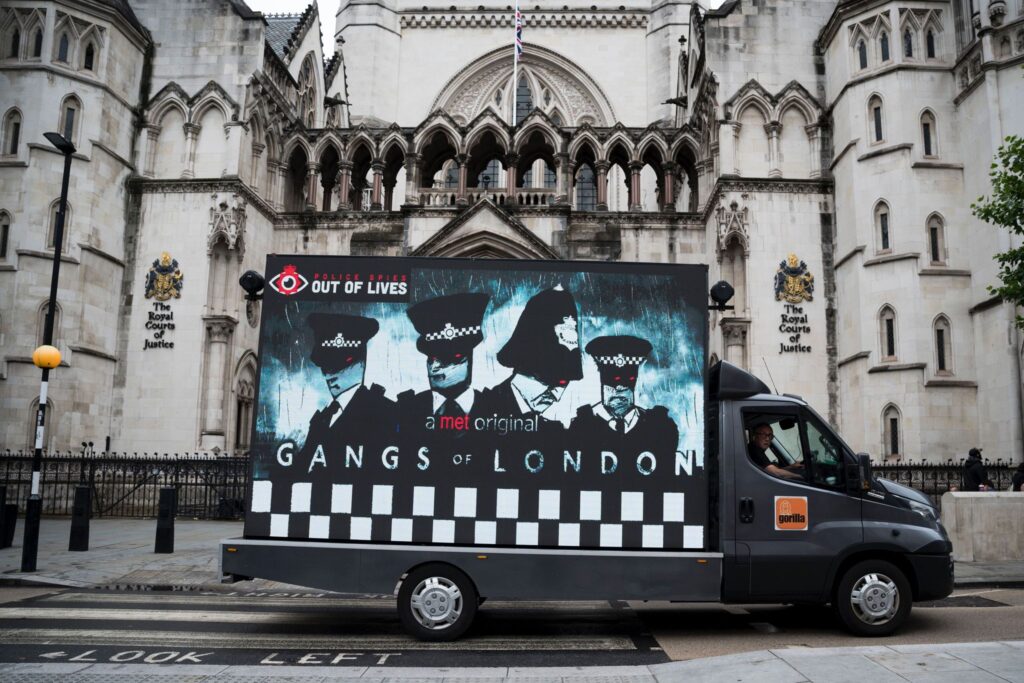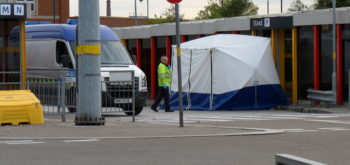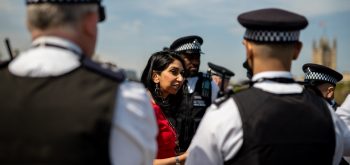Women deceived into relationships by undercover police officers have called on the Met to ‘stop protecting themselves’ and to hand over files. The campaign group Police Spies Out of Lives (PSOOL) welcomed the ‘damning’ interim findings of the ‘spycops’ inquiry published eight years and claims it shows the use of an undercover unit as ‘unjustified and undemocratic’. (Illustration by Henny Beaumont)
Sir John Mitting, who chairs the inquiry, has said that most groups infiltrated by the police posed and no threat and the ‘ends did not justify the mens’. ‘In the era of the Cold War and the “Troubles”, applying the standards of the time, the infiltration of groups which in fact threatened the safety or well-being of the state… could also have been justified. In the period covered by Tranche 1, only three groups penetrated by the Special Demonstration Squad (SDS) satisfied either of these criteria,’ he said. ‘The great majority of deployments by the SDS in this period did not satisfy either criterion.’
Theresa May, then Home Secretary, announced the inquiry in March 2015 following revelations about the infiltration of the Stephen Lawrence campaign to review undercover policing practices going back 50 years. Such concerns had been raised by journalists and activists including women who had been deceived into sexual relationships, as well as the revelations of the former SDS officer Peter Francis who turned whistleblower in 2014 and spoke out about spying on the family of Stephen Lawrence.
- You can read a summary of the interim report by PSOOL here and an archive of articles on the Justice Gap about spycops here.
The SDS ran from 1968 to 2008 and was deployed to infiltrate political and activist groups, with the intention of gathering intelligence to assist in public order policing.
In yesterday’s report, Sir John Mitting said that the ‘principal, stated purpose’ of the SDS was to ‘assist uniformed police to control public order in London’. ‘Long-term deployments into left-wing and anarchist groups did make a real contribution to achieving this end, even though this was or could have been achieved to a significant extent by other, less intrusive, means,’ he wrote. ‘The question is whether or not the end justified the means set out above. I have come to the firm conclusion that, for a unit of a police force, it did not; and that had the use of these means been publicly known at the time, the SDS would have been brought to a rapid end.’
Mitting said that the long-term deployment of male undercover officers had ‘a further consequence’ and reported that between 1968-1982 six undercover officers had sexual relationships with at least 13 women. ‘This was to become a perennial feature of the SDS throughout the remainder of its history,’ Mitting said. ‘The extent, if at all, to which its managers and other undercover officers knew about the relationships and/or tolerated them is a matter of controversy and conflicting evidence.’
The report states that officers entering into sexual relationships with women was a ‘perennial feature of the SDS throughout the remainder of its history.’ This was a feature that would remain throughout the unit’s operation, until its closure in 2008. One officer, Vincent Harvey, initially told the Inquiry he had four ‘one night stands’ with four women. It was later revealed that he in fact had a two-month relationship with one woman, known as Madeleine. Harvey admitted in evidence to the inquiry that if Madeleine had known he was an undercover police officer she would not have consented to sex with him.
Madeleine gave evidence to the Inquiry. ‘Harvey lied, hoping it would never come out 40 years later. Unfortunately for him, I came forward, and the Chair believed me over this very senior police officer. How many lies have been told by other officers, whose victims were unnamed and unknown?’
Kate Thomas, a solicitor at Birnberg Peirce, representing the women. ‘Since our clients first exposed these undercover policing units over twelve years ago, they have been fighting to uncover the truth of what happened and to ensure that the police never subject women to this abuse again,’ she said. ‘They continue to request urgent disclosure of all the files that have been kept on them to ensure that the full truth about these operations comes to light.’
‘The women deceived into sexual relationships by undercover police officers blew the cover on a dark secret hidden even within the Met police,’ comemented Harriet Wistrich, director of the Centre for Women’s Justice. ‘The Inquiry must now go on to shed further light on the origins of a misogynistic culture that pervades policing today, as exposed in the Baroness Casey review and the phenomenon of police-perpetrated abuse.’
PSOOL points out the report ‘barely addresses’ many concerns and, for example, there was ‘not a single mention’ of ‘blacklisting’ workers for their political activities or spying on trade union activities. There was also ‘a lack of any critical analysis’ of how these findings so far relate to contemporary issues facing the police, such as institutional racism as identified by the Macpherson Inquiry, corruption as identified by the Daniel Morgan report and ’emerging revelations of institutional misogyny’ following the kidnap, rape and murder of Sarah Everard. ‘We can hope that this is because the Inquiry is still ongoing, and that judgement on those issues, and on the overall unlawfulness of the operations, is being deferred until all the evidence has been heard,’ the group said.







